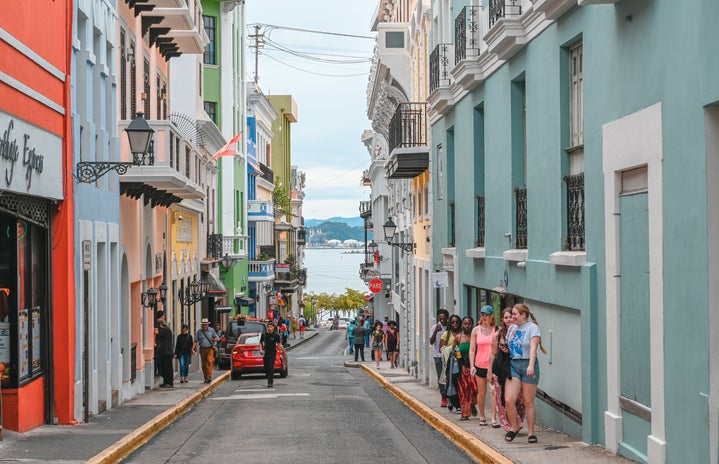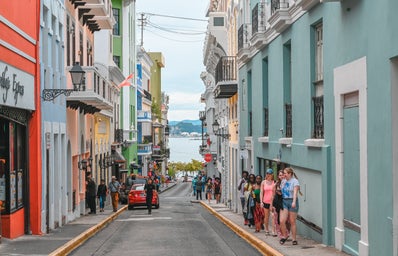Could Puerto Rico be the next star added to the American Flag? Puerto Rico has been on the long journey towards statehood, similar to what the District of Columbia has been doing as well. Up for discussion is the current status of the island, the three main political parties in Puerto Rico and their views on statehood. This is an extremely important topic and it is necessary to analyze what is currently being done to make Puerto Rico a state.
The Current Status
On October 18th, 1898, Puerto Rico fell under U.S. control following the end of the Spanish-American war when Spain ceded the island in cooperation with the 1898 Treaty of Paris. Fast forward to the year 1917, Puerto Rico became a U.S. territory and its people became U.S. citizens.
Currently, Puerto Rico is an unincorporated territory of the United States classified as a commonwealth; meaning Puerto Rico has established its own government and constitution. Additionally, because they are not a state or nation, but a territory, the nation lacks certain rights. For instance, Puerto Ricans cannot vote in Presidential elections and they do not have any representation in the Senate or Congress. However, Puerto Rican residents are considered citizens of the United States, allowing them to travel to the country without showing proof of citizenship or facing harsh immigration conditions. English is also taught to every grade level in schools across the island.
Puerto Rico’s Three Main Political Parties
The three main political parties in Puerto Rico are Partido Nuevo Progresista or The New Progressive Party (PNP), Partido Popular Democrático or Popular Democratic Party (PPD), and Partido Independentista Puertorriqueño or The Puerto Rican Independence Party (PIP). The parties all differ in their stances when it comes to statehood for Puerto Rico. On the side of statehood stands the PNP, in favor of territorial status is the PDP, and lastly, the PIP is in favor of complete independence. The parties’ hold immense power within the statehood issue and are often voted on based on their stance on this issue.
Road to Statehood
Actions have been taken towards Puerto Rico’s statehood. Representative Darren Soto from Florida District 9 introduced a bill that outlined Puerto Rico’s admission into the union as a state. Puerto Rico does not have any ability to introduce this bill due to their lack of representation in the Senate or Congress so it was necessary for a state representative to introduce it. In the bill, Congress found 20 reasons that would support Puerto Rico’s admission into the union, which discussed aspects including how Puerto Rico’s territorial constitution is compatible with that of the United States, and how the Puerto Ricans have greatly influenced the nation and its culture. This bill is based on a majority vote of the Puerto Rican citizens, who have already taken part in two different plebiscites about the issue.
The first plebiscite that citizens took part in was in 2017 and resulted in 97.13% of the votes casted in favor of statehood whereas 1.52% of the votes were in favor of independence/free association and 1.35% of the votes were in favor of the current territorial status. Due to the outstanding results, action was immediately taken towards the proclamation of Statehood. These results were sent to the former Governor of Puerto Rico Ricardo Rosello, Resident Commissioner Jenniffer Gonzalez-Colon, and to the Legislative Assembly and the Secretary of State of Puerto Rico. Additionally, Puerto Rico sent a bipartisan Statehood Commission to Washington, urging Congress to take the steps necessary for Puerto Rican Statehood.
Puerto Rican citizens took part in a second plebiscite in 2020. This plebiscite took place following the resignation of former Governor Rosello and the rise of Governor Pedro Pierluisi in January 2020. The results were 52.52% for statehood and 47.48% voting against statehood. They also found that more people voted for statehood than those who voted for Governor Pierluisi, who is pro-statehood. Despite who Puerto Rico’s governor is, Puerto Ricans want their island to become part of the United States. Following the first plebiscite, Puerto Rico filed a petition for statehood and an admissions bill was filed in Congress. However, it did not advance which led to the second plebiscite in hopes of advancing another bill. President Joe Biden has expressed his support for Puerto Rico’s statehood, saying that statehood would ensure that Puerto Ricans are treated equally.
Despite Rosello’s resignation he was still written to be part of the 2021 Puerto Rican Congressional Delegation; this was a committee created to enforce the results of the 2020 plebiscite and support statehood.
However, at the end of day, it is Congress that will make the decision of whether or not to advance the bill. Currently, the bill introduced by Representative Soto has not yet been approved by the House, but there have been Committee Hearings held about the bill. The next step is getting the bill passed by the House, moving Puerto Rico one step closer towards becoming the 51st state.
Why is This Matter Important?
This issue goes beyond Puerto Rico’s want for statehood as it also relates to inner workings of democracy and fair representation. Not only is Puerto Rico going through the process of statehood, but so is D.C. As students who attend American University in D.C., we will become immersed in the process of statehood, so we might as well start to learn about it. Currently, there is talk about how D.C. and Puerto Rico will join forces in the journey towards statehood, similar to how Hawaii and Alaska joined the union in the same year. District of Columbia leaders support “…Puerto Rico achieving statehood and are open to working with the territory’s leadership to see that both join the union together” (Wright). Should statehood be given to D.C. and Puerto Rico, representation in the Senate and the House will become more diverse, increasing racial and ethnical equality in Congress.


